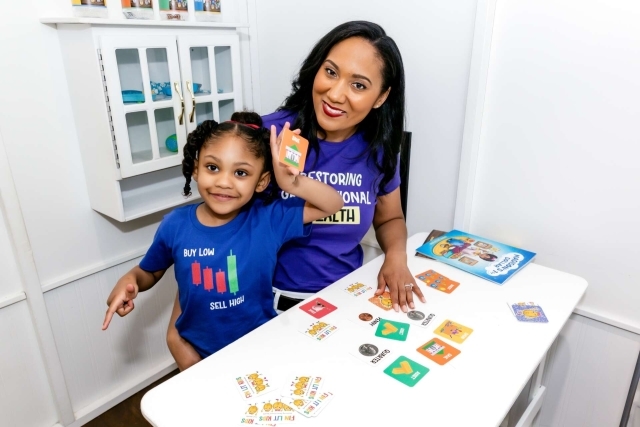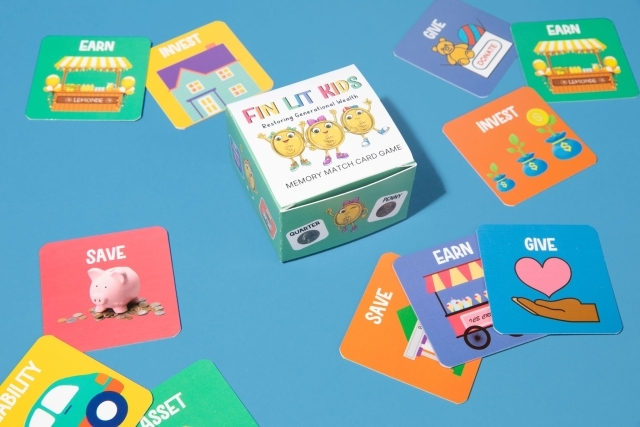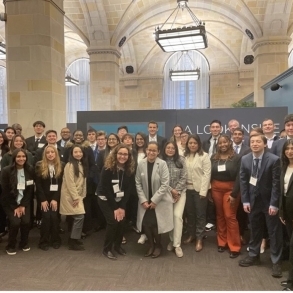Financial Literacy Tips and Lessons from Ebony Beckford ’03CPS

Are you a college student or a recent graduate who wants to learn how to build a solid financial foundation for your future? In this Q&A session, we speak with Ebony (Rentas) Beckford ’03CPS, a St. John’s alumna who is an author, entrepreneur, and financial literacy advocate. Ms. Beckford shares her personal story of overcoming financial challenges during and after graduation. She also provides simple steps that anyone can take to develop a healthy relationship with money and how these practices are applied in her company, Fin Lit Kids.
Tell us about your financial journey during your college years.
My financial journey during my college years was challenging. In my first year of college, shortly after opening a student checking account with $200 in overdraft protection, my mother unexpectedly passed away. Initially, I had used the overdraft to cover the cost of Christmas gifts, intending to repay it quickly. However, her passing left me unable to settle the debt, which severely impacted my credit score.
This early financial setback had long-term consequences. It affected my ability to secure favorable rates on student loans and even influenced my housing options after graduation. Navigating these financial difficulties taught me crucial lessons about the importance of financial planning and the impact of credit management.
What was the turning point in your personal or professional journey that made you realize the importance of financial literacy?
I realized the importance of financial literacy when I was expecting my daughter, Madison. The reality of my past financial struggles, especially after my mother’s death, really hit me hard. I wondered where I might have been if I had known more about managing money.
Remembering how difficult things became financially after my mom passed, I was determined not to let Madison face the same challenges. So, I decided to invest time in understanding financial literacy to equip my daughter with the tools she needs to succeed.
What are some simple ways young adults can start developing a healthy relationship with money?
First, recognize that your habits and attitudes toward money greatly influence your financial health, more than just a lack of knowledge. Subconscious thoughts and behaviors often drive our spending habits. Even though we know saving is essential, many who can afford to save still don’t, usually because of ingrained habits.
Additionally, I recommend reflecting on the reasons behind your purchases. For example, when you buy the latest smartphone or a trendy fashion item, ask yourself: Am I seeking status and/or self-esteem, or trying to fit in with my peers?
Understanding our emotional connections with spending can profoundly affect our long-term financial health. It’s important to ask ourselves why we do what we do and regularly check in. To help with this, I set aside time every Monday to review all my accounts, regardless of their balances or how difficult it may be.
Which three questions should one ask themselves when building good financial habits?
When you’re trying to build good financial habits, there are three important questions you should keep in mind. First, ask yourself, “What purpose does this serve?” This helps you determine if your spending aligns with your values—basically, making sure your money goes to the right places.
Next, consider, “How does this help me progress?” It’s all about ensuring each financial decision moves you toward your goals.
And finally, always check in with, “Does this bring me peace of mind?” At the end of the day, you want to feel confident and calm about your finances, knowing you’re making choices that keep your stress low and your security high.
What financial advice would you give your college self if you could go back in time?
If I could go back, I’d tell myself to utilize all the resources at my disposal fully. I’d build strong relationships with the Office of Student Financial Services and the Center for Student Success to help identify the best loans and grant programs. I would also strategically network with faculty and like-minded students to gain insights into career opportunities and enhance my academic performance.
Additionally, I would ensure I thoroughly understood any financial agreements I signed, especially concerning student loans. Adopting this proactive approach would have significantly enhanced my ability to navigate college finances.
How do you promote financial literacy through your company, Fin Lit Kids? How does it differ from other youth financial literacy initiatives?
At Fin Lit Kids, we promote financial literacy by creating engaging and accessible products that teach basic money management skills to children ages 3–7. Our approach involves interactive tools like games, storybooks, and digital products that make learning about finances fun and memorable.
What sets us apart from other youth financial literacy initiatives is our focus on very young children. We believe that building financial literacy skills from an early age lays a strong foundation for healthy financial habits later in life.
Additionally, we provide resources for parents and educators to help them integrate these lessons into everyday activities, ensuring that financial education is not just a classroom topic, but a part of daily family life. This holistic approach helps create an environment where financial literacy is continuously reinforced.
What is your vision for financial literacy education, and how can you contribute to it through Fin Lit Kids?
Our vision at Fin Lit Kids is to empower the next generation with the necessary tools to make informed financial decisions from an early age. We aim to instill a fundamental understanding of money management in young children, preparing them for a lifetime of financial well-being.
By focusing on foundational concepts, we hope to cultivate healthy spending habits and a mindset that values thoughtful financial planning and responsibility. By making financial literacy a core component of early childhood education, we can significantly influence the financial health of future generations, helping them avoid common financial pitfalls and build prosperous futures.
Learn more about Ebony’s journey and how Fin Lit Kids is helping to restore generational wealth.
- Read Ms. Beckford’s full story.
- Visit the Fin Lit Kids website.
- Follow Fin Lit Kids on Instagram for updates on their latest products and initiatives @finlitkidsbox.







